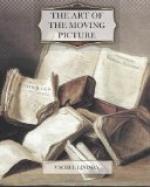The big social fact about the moving picture is that it is scattered like the newspaper. Any normal accompaniment thereof must likewise be adapted to being distributed everywhere. The present writer has seen, here in his home place, population sixty thousand, all the films discussed in this book but Cabiria and The Birth of a Nation. It is a photoplay paradise, the spoken theatre is practically banished. Unfortunately the local moving picture managers think it necessary to have orchestras. The musicians they can secure make tunes that are most squalid and horrible. With fathomless imbecility, hoochey koochey strains are on the air while heroes are dying. The Miserere is in our ears when the lovers are reconciled. Ragtime is imposed upon us while the old mother prays for her lost boy. Sometimes the musician with this variety of sympathy abandons himself to thrilling improvisation.
My thoughts on this subject began to take form several years ago, when the film this book has much praised, The Battle Hymn of the Republic, came to town. The proprietor of one theatre put in front of his shop a twenty-foot sign “The Battle Hymn of the Republic, by Harriet Beecher Stowe, brought back by special request.” He had probably read Julia Ward Howe’s name on the film forty times before the sign went up. His assistant, I presume his daughter, played “In the Shade of the Old Apple Tree” hour after hour, while the great film was rolling by. Many old soldiers were coming to see it. I asked the assistant why she did not play and sing the Battle Hymn. She said they “just couldn’t find it.” Are the distributors willing to send out a musician with each film?
Many of the Springfield producers are quite able and enterprising, but to ask for music with photoplays is like asking the man at the news stand to write an editorial while he sells you the paper. The picture with a great orchestra in a far-off metropolitan Opera House, may be classed by fanatic partisanship with Grand Opera. But few can get at it. It has nothing to do with Democracy.
Of course people with a mechanical imagination, and no other kind, begin to suggest the talking moving picture at this point, or the phonograph or the mechanical piano. Let us discuss the talking moving picture only. That disposes of the others.




